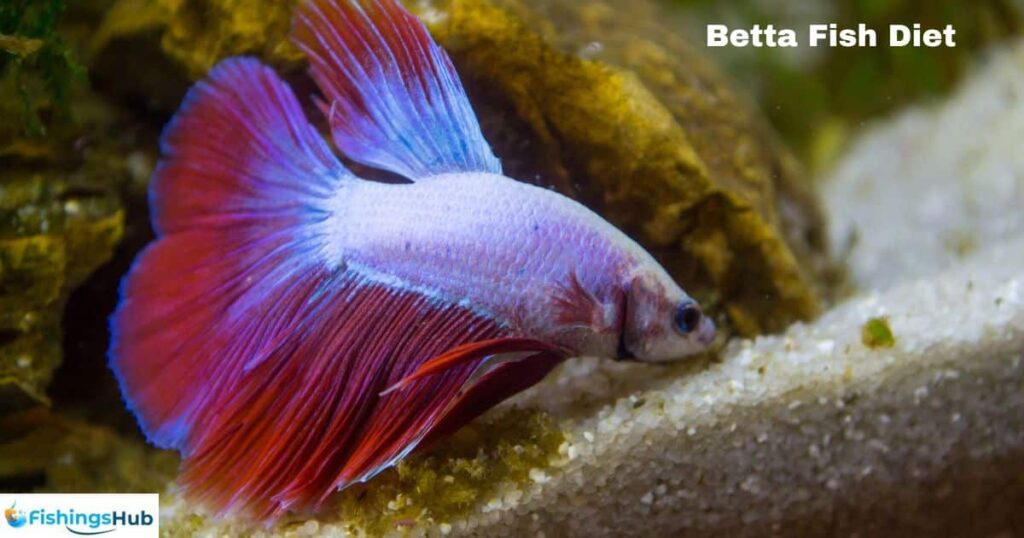Betta fish are beautiful, colorful, and often kept as pets in small tanks. Just like any pet, they need the right care. One essential part of their care routine is feeding. But how often should you feed them to keep them healthy?
Imagine having a beautiful betta fish at home, swimming gracefully. Now, picture it being unhappy or even sick because of the wrong feeding schedule. The right feeding routine is crucial for its happiness and health.
Betta fish, also known as Siamese fighting fish, are unique creatures that require special attention. Unlike some pets that eat multiple times a day, bettas have specific needs. Feeding them the right amount, and at the right times, ensures they stay active, vibrant, and live longer. So, how often do you really need to feed them? Let’s dive deeper into this fishy topic.
Betta Fish Diet

Betta fish are carnivorous by nature. In the wild, they primarily consume insects, larvae, and small crustaceans. Their digestive system is designed to process protein-rich foods efficiently. When considering their diet in captivity, it’s essential to replicate this natural diet as closely as possible.
The Importance Of Balanced Nutrition
For bettas to thrive, a balanced diet is essential. While protein is crucial, they also benefit from other nutrients and vitamins. Overfeeding or providing an imbalanced diet can lead to health issues, including obesity and swim bladder disorders. Thus, understanding the right amount and type of food is vital.
How Often Should You Feed Your Betta Fish?
The frequency of feeding betta fish can vary based on their age, size, and overall health. Here’s a general guideline:
- Adult Bettas: Feed them once a day, providing an amount they can consume in about 2-3 minutes.
- Young Bettas: For younger bettas or fry, feeding twice a day is recommended, but in smaller quantities.
Tips For Feeding Betta Fish

Consistency is Key: Establishing a consistent feeding routine helps bettas feel secure. Try to feed them at the same times each day.
Monitor Consumption: Only offer what they can consume in a short time. If there’s leftover food after a few minutes, you’ve likely provided too much.
Variety is Essential: While pellets and flakes are popular choices, consider supplementing their diet with live or frozen foods like bloodworms or brine shrimp occasionally. This provides essential nutrients and mimics their natural diet.
Avoid Overfeeding: Overfeeding is a common mistake. Bettas will often eat as much as you offer, leading to health problems. Always prioritize quality over quantity.
Signs of Overfeeding or Underfeeding
Recognizing signs of overfeeding or underfeeding is crucial for betta health:
a) Overfeeding Symptoms:
- Cloudy water
- Fish becomes lethargic
- Bloated appearance
- Excess food at the tank’s bottom
b) Underfeeding Symptoms:
- Noticeable weight loss
- Reduced activity levels
- Begging behavior or constantly searching for food
Additional Care Considerations
While feeding is a significant aspect of betta care, several other factors contribute to their well-being:
Water Quality: Regularly check and maintain the tank’s water quality. Clean water free from toxins is essential for betta health.
Tank Size and Environment: Ensure your betta has enough space to swim and hide. A suitable environment promotes their natural behaviors and reduces stress.
Temperature and Lighting: Bettas are tropical fish. Maintaining a consistent water temperature between 76-81°F (24-27°C) and providing appropriate lighting supports their overall health.
Can I Overfeed My Betta?

Feeding your betta too much can cause serious health issues. Overfeeding may lead to problems such as bloating, constipation, and even severe conditions like fatty liver disease. In addition, overfed bettas may become less active and seem tired. It’s crucial to provide the right amount of food for their well-being.
FAQ’s
Do betta fish need to eat every day?
For your betta fish, it’s best to give them 2 to 4 pellets, either once or twice daily. Remember, pellets swell in water and can be quite satisfying for your betta. Consider replacing their pellet meals with freeze-dried or fresh food 1 to 2 times a week.
Should I feed my betta every other day?
The size of your betta’s stomach is roughly equivalent to its eye size. Thus, ensure you don’t give them more food than this. It’s advisable to feed your betta either daily, twice daily, every other day, or once every 2-3 days.
Can betta fish survive 3 days without food?
If you’re planning to be away from your betta fish for a few days ensure they have fresh water and think about using fish-specific automatic feeders for their meals. It’s worth noting that bettas have tiny stomachs. To clarify, yes, bettas can go without eating for up to three days and still be okay.
Is my betta happy if he makes bubbles?
Spotting a bubble nest in your tank can show a healthy betta. Nonetheless, it’s crucial to maintain regular water changes, check your water quality, and observe your betta’s behavior to guarantee its well-being.
How long does a betta fish live?
Betta fish usually live for about two to four years. However, with proper care, they can sometimes reach up to five years. If your betta reaches this age, it’s an accomplishment to be proud of, as five years is considered a long life for these fish.
Final Thoughts
How Often Do You Feed Betta Fish? Betta fish are truly unique creatures with specific needs when it comes to their diet. Just as we need the right amount of food to stay healthy, so do bettas. Ensuring they get the correct amount and type of food, along with a balanced diet, is essential for their well-being. Remembering to observe them closely, providing a consistent feeding routine, and offering variety in their diet can make all the difference.
Ensuring a betta fish’s health and happiness goes beyond just feeding. It’s a combination of understanding their natural habitat, providing the right environment, and giving them the care they deserve. By doing so, we not only enjoy the beauty they bring but also ensure they lead a long, vibrant life.

